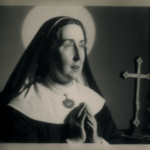St. David I of Scotland
St. David I of Scotland
When They Lived:
St. David I of Scotland, also known as David the Saint, lived from around 1084 to 1153.
Where They Lived:
David I primarily resided in Scotland during his reign, with a focus on expanding his influence and establishing a strong foundation for the Scottish monarchy.
Notable World Events During Their Life:
- The First Crusade (1096-1099): The First Crusade was a significant event that occurred during David I’s lifetime. It was a series of military campaigns by Western European Christians to recapture the Holy Land from Muslim control. Although David I himself did not directly participate, the Crusade had profound effects on the political and religious landscape of Europe, including Scotland.
- The Investiture Controversy (1075-1122): This was a major conflict between the papacy and secular rulers, particularly Holy Roman Emperor Henry IV, over the appointment of bishops and the authority of the Pope. While primarily centered in the Holy Roman Empire, the controversy had implications across Europe and influenced the relationship between church and state during David I’s reign.
- The Anarchy (1135-1154): This was a civil war in England and Normandy, a period of political instability and conflict over the English throne between supporters of Matilda, daughter of Henry I, and her cousin Stephen of Blois. This tumultuous period had implications for Scotland as well, as it affected the broader geopolitical dynamics in the British Isles.
- Birth of Universities: During David I’s reign, the first European universities were established, marking a significant advancement in education and scholarship. While not a single event, this development significantly impacted the intellectual landscape of the time.
Their Patronage:
St. David I of Scotland was a patron of religious reform and cultural advancement.
Escape to England
At some point, he was temporarily exiled in England in 1093, after his father and brother were killed during an invasion and his mother passed away shortly afterwards. St. David’s paternal uncle besieged them and took over the reins to become the king of Scotland, which resulted in David being exiled.
During his stay in England, the King of England, Henry, married David’s sister, and due to the fact that he was now the brother-in-law to the king, St. David became a dependent at the court of King Henry I. It was during this time that he was influenced by the Anglo-French culture of the court.
David’s brother, who had now become the King, Edward of Scotland, died in 1107; his younger brother Alexander took over, and it was only then that St. David returned to Scotland. It was also after his return that he was able to possess his inheritance with the backing of King Henry. There was no bloodshed, but it came through threats.
His Way to Becoming the King
When David’s brother, King Alexander, died in 1124, David decided to take the kingdom of Scotland for himself, and he had the support of King Henry. It was, however, not a simple task, as he had to engage in warfare against his rival and nephew for the throne. This was fuelled by the fact that St. David’s legitimacy to the throne was questionable, but he had the great advantage of having the support of King Henry.
It took St. David ten years to finally defeat his rival, and the struggle involved the destruction of some cities. During his coronation, there were some rituals that were part of the usual coronation that were unchristian,” and it took a lot of effort from the bishops to convince St. David to engage in them.
Due to the fact that St. David spent most of his childhood in England, he initially had little connection with the culture and society of the Scots. He, however, was able to familiarize himself with the culture and practices of the Scots during the later stages of his reign.
St. David as the King
When St. David finally took over, he expanded his control over more distant regions. He was able to expand his powers into northern England.
The new territories that were now under St. David’s control were a valuable supplement to his income and manpower. This increased his status as he became known as one of the most powerful in the kingdom of England. After the year 1114, St. David spent most of his time outside his kingdom, as he would be in England or Normandy.
There is the term Davidian Revolution, which is used by some scholars to summarize the changes that took place in Scotland during the time when St. David was king. Some of the changes that happened include the foundation of regional markets, the implementation of the ideals of the Gregorian Reform, and the foundation of monasteries.
Throughout his time as King of Scotland, St. David faced a lot of uprisings against him, but he managed to conquer them. He fought a lot of wars with those who believed that they were the rightful heirs to the throne. King Henry’s support for St. David was a great asset for him to be able to have those victories.
Even though he was the king of Scotland, St. David had strong ties with England, and he put efforts into upholding the intended inheritance of Henry I, the succession of his daughter Empress Matilda. He even went to great lengths to engage in wars in the efforts of protecting Empress Matilda’s interests.
His Contribution to the Church
St. David is known for having a pioneering role as the instrument of diocesan reorganization. He was the defender of the Scottish Church’s independence from the claims of lordship by the Archbishop of York and the Archbishop of Canterbury.
During his time as king, he restored bishops as well as erected new ones so that they could lead those churches that were wavering without a pastor. He also restored some bishoprics.
5 Interesting Facts About St. David I of Scotland
- St. David’s mother is also a saint.
- When St. David claimed his inheritance, it inspired some resentment.
amongst some native Scots, as they viewed him as being aggressive. - Even after the death of St. David’s sister, King Henry continued to
support him. - St. David served as a judge at Woodstock for the treason trial of
Geoffrey de Clinton. - St. David is known as King Henry’s greatest protégé.
Prayer to St. David I of Scotland
Almighty God, You called your servant David to be a faithful and wise steward of your mysteries for the people of Wales. Mercifully grant that, following his purity of life and zeal for the gospel of Christ, we may with him receive our heavenly reward through Jesus Christ our Lord, who lives and reigns with you and the Holy Spirit, God, forever and ever. Amen



